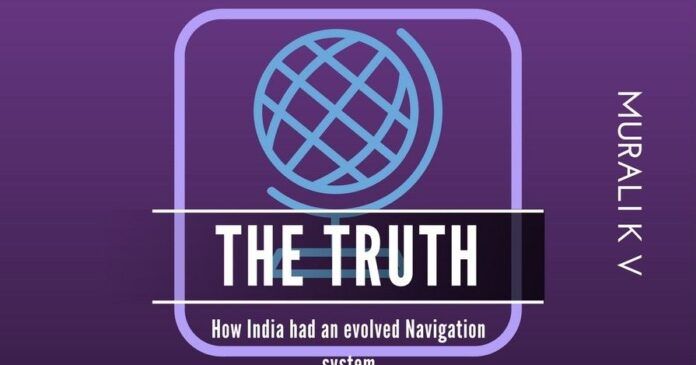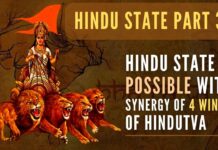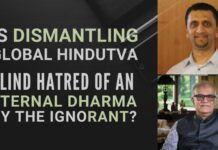
Seeking the truth through a non-schizophrenic approach
Clarifying Aravindan Neelakandan’s stance in “Rabbits, World Maps And Mahabharata: Seeking The Truth Through Tradition And Science,” which lacks references from the history and philosophy of science and mathematics.
If this is too technical or difficult to understand for the mathematically and philosophically challenged, here is a simple “treat.”
The primitiveness of the West is attested in the most direct yet cleverly phrased diplomatic manner by no less a person than M K Gandhi himself. It goes like this:
Journalist: What do you think of Western civilization?
Gandhi: I think it would be a good idea.
However, in its supreme (or rather supremacist?) academic spirit the West appears to question the validity of this witty yet profound quote attributed to M K Gandhi. (Garson 2013). Nothing wrong with such an exercise of determining the validity and truth of commonly accepted “truths,” and it should be most welcome… if only the West applied the same standards to itself and its exalted history.
Koenraad Elst apparently is said to have summarised the issue that we are trying to address here as, “problems have been created by a tendency among Hindus to live up to expectations raised by their enemies.”
Decolonising Aravindan Neelakandan
C K Raju, an internationally renowned mathematician has the following to say about the state of European knowledge on navigation and mathematics: ‘As the 7th c. Indian mathematician Brahmagupta remarked, “ignorance of the earth’s radius makes longitude calculations futile”. The West HENCE had the problem of determining longitude at sea, a navigational problem which persisted at least until the mid-18th c., as even British government agencies were compelled to acknowledge.’ If the West was so hamstrung that it cannot determine the longitude right, how could they have “independently” drawn the map of the world? One must realise, the longitude converges towards the poles and the geometry on the surface of the earth is not a simple planar triangular model. Without the longitude, because they could not determine the size of the earth’s sphere (assuming they understood that the earth was indeed spherical), and thus having no navigational skill to physically sail or map the landmass of the planet. In such a case, to assume that the Europeans drew the first modern map of the world and that too independently, and then to claim this knowledge of the European maps must have been interpolated onto verses from our ancient literature is simply Machiavellian, not just Macaulayan, to say the least. (Raju 2009, 2016, 2012).
On the contrary, Indians and Arabs had a far more advanced mechanism of navigation and navigational instruments (Rapalagai and Kamal) that was accurate to less than 11 miles on the open seas. For more on how this worked, refer to this excellent essay by D P Agarwal. Only this level of accuracy would allow navigation amongst the numerous small and tiny islands, that were populated and were used as resting or trading posts in the Indian Ocean and the Indian Sea (now the Arabian Sea). The Europeans were completely lacking in this skill as attested by their own records as recently as the late-18th to early-19th century. In addition to these, there is a plethora of evidence against the European understanding of basic and advanced mathematics that can demonstrate even today, both mathematically and empirically, that the West has not yet understood what it plagiarised and then mythologised as having a Greek-European origin. (Raju 2007, 2017)
Navigation, with Roman numerals?
If this is too technical or difficult to understand for the mathematically and philosophically challenged, here is a simple “treat.” Imagine doing even the basic addition and subtraction with Roman numerals (I, II, III, IV…) used by the Greeks and the Europeans, then be a little more adventurous and try multiplication and division, and if one is lion-hearted he / she should also try fractions and decimals using the same numerals. This revealing exercise amply demonstrates that a system which cannot even perform basic arithmetic, could not have birthed accurate trigonometric tables and such required for navigation and building a scientific calendar (almanac for navigation)? Believing affirmatively to this question is not just believing in a myth, but propagating a fraud. (Raju 2017). In fact, our humble Panchangam is one such sophisticated almanac, extended and elaborate versions of which were indeed used for navigational purposes (https://www.youtube.com/watch?v=MvpuC7Dg4e0). (Raju 2007).
Ram Swarup observed writing on the failure of the 1942 Quit India movement in his inimitable style: “Hate the sin and not the sinner, was the motto. For, this is true both ethically as well as logically. Ethically, we should not hate or harm anybody. Though I, on my part, cannot see how you can help singeing nobody’s beard if you go around with the ‘Torch of Truth’. The proposition was also logically true. British exploitation of India is not the same thing as the British exploiters of India. Every time they said they hated British imperialism, they hastened to add they loved the British people. What an attitude towards those with whom, you know, you are not arguing, but against whom you are fighting.”
Ram Swarup’s brilliant acerbic should be restated for our very own Hindutva-vadi as: “Hate the plagiarists and not the plagiarism… For Macaulay’s education makes one believe in the inferior modern psychology compared with groundbreaking Bharatiya mind-consciousness paradigms and its achievements that are amply recorded if only one were to look for it away from Dawkins and co… Scientific failures of yesteryear Europeans is not the same thing as the failures of ancient Indians (if at all ancient Indians had failed, but that is immaterial). Every time an ancient Indian achievement is pointed out, one should hasten to point out that the figures (in Hindu numerals) are not as accurate as a billion dollar NASA supercomputer (not even our own PARAM-series that too) is, but they reflexively add how we should draw parallels to the (bogus) Greeks (that too quite incessantly) to prove our possible equality and not more (in spite of us being light years ahead in a real and honest judgment of superiority). What an attitude towards those with whom one is neither arguing nor fighting, but seeking out intellectualism based on standards set by Macaulayites.”
With apologists like Aravindan Neelakandan, it is only a matter of time before the world regresses to a state of using Roman numerals again. (Malhotra 2017)
References:
- Garson. 2013. “‘What Do You Think of Western Civilization?’ ‘I Think It Would Be a Good Idea’ | Quote Investigator.” April 23. https://quoteinvestigator.com/2013/04/23/good-idea/.
- Malhotra, Rajiv. 2017. “Vedic Framework and Modern Science.” Accessed September 30. https://swarajyamag.com/culture/vedic-framework-and-modern-science.
- Raju, C. K. 2007. Cultural Foundations of Mathematics: The Nature of Mathematical Proof and the Transmission of the Calculus from India to Europe in the 16th C. CE. Pearson Education India.
- ———. 2009. Is Science Western in Origin? Daanish Books.
- ———. 2012. Euclid and Jesus. Multiversity and Citizen International.
- ———. 2016. “Was Euclid A Black Woman? Sorting Through The False History And Bad Philosophy Of Mathematics.” Science 2.0. October 24. http://www.science20.com/the_conversation/was_euclid_a_black_woman_sorting_through_the_false_history_and_bad_philosophy_of_mathematics-180581.
- ———. 2017. “Black Thoughts Matter.” Journal of Black Studies 48 (3). SAGE Publications Inc: 256–78.
Note:
1. The views expressed here are those of the author and do not necessarily represent or reflect the views of PGurus.
- Priyanka Vadra continues the illegal abuse of Gandhi’s name and legacy - March 19, 2019
- Is secularism the other side of genocide and is it thus unconstitutional? - November 10, 2018
- Is Yogi’s government inadvertently putting the Kumbh Mela at subversive risk by Breaking India forces at Harvard et al? - October 17, 2018











The article is fine but the approach not doing nirakarana of Aravindan Neelakandan’s article. The author has to first summarise the thesis of Aravindan in a purvapaksha form. Then it need to be rejected wirh Uttarpaksha. How Aravindan’s approach colonial? is not colonial.